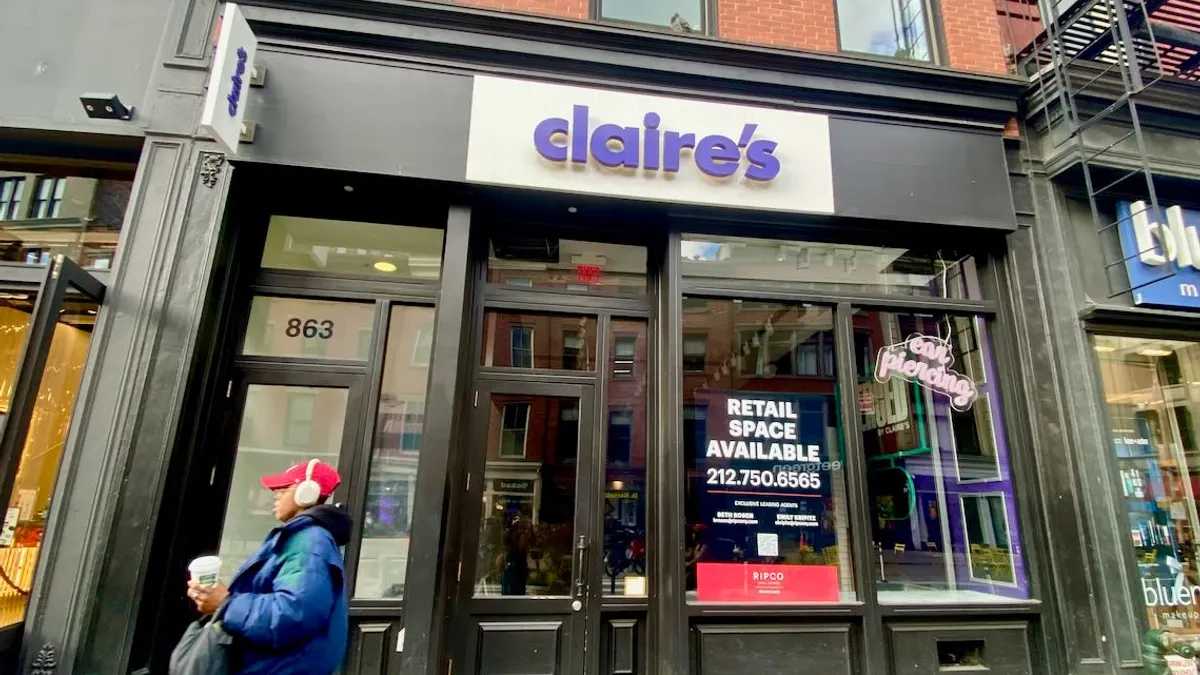Retailers are already preparing for the disappearance of Toys R Us from the market.
Since the toy retailer filed for bankruptcy last fall, media and analysts have speculated on who might grab Toys R Us' market share should it close stores or fail altogether. Now many are making plans to push deeper into the category as the 70-year-old toy retailer winds down.
Walmart, which is often credited with being among Toys R Us' killers, said last week it plans to expand toy offerings. Steve Bratspies, chief merchandising officer for Walmart U.S. said Wednesday in a Q&A with reporters that the retail giant is planning for "a big toy market this year."
"We're buying more toy inventory than we would traditionally in the past, because there's more volume up for grabs," he said. "We're also doing some work on space in our stores and programming around the back half of the year and holiday time frame. You should expect us to be very competitive in the toy space."
Target, which added 1,400 toys to its offering in 2017, is also beefing up the category in stores. COO John Mulligan said in a May conference call with analysts that "our teams in toys and baby have increased their inventory investment to ensure that we can meet higher demand as other competitors liquidate and exit these categories," according to a Seeking Alpha transcript. Target Chief Merchandising Officer Mark Tritton said on the call that, despite pricing pressure from the liquidation of Toys R Us stores in the first quarter, toys at Target were the strongest growing hardlines category in the first quarter.
UBS analysts in December noted that 93% of Toys R Us stores were within a 15 minute drive of a Target, and they expected at the time that the mass merchant would capture 25% of sales leftover in the initial wave of Toys R Us store closures. (The analysts also estimated that 90% of Toys R Us stores were within 15 minutes of a Walmart.)
Unable to resist the opportunity, other retailers are gravitating to the category as Toys R Us winds down its domestic business. Kohl's CEO Michelle Gass told analysts earlier this month that the department store retailer planned to "increase our relevancy in the toy space" through the addition of Lego and FAO Schwarz branded products in September — just ahead of the all-important holiday season. "And I'm confident they will resonate strongly with our customers," she said, according to a Seeking Alpha transcript of the call.
Kohl's has company in the department store space. J.C. Penney — whose catalogs used to be filled with toys — has also expanded assortment. Last July, just a couple months before Toys R Us filed for Chapter 11, Penney said it was adding toy shops to all of its stores and a "significantly" expanded assortment online. "Toys are an exciting product category for J. C. Penney and an in-store attraction that will drive traffic and sales as we continue to focus on increasing revenue per customer," John Tighe, then Penney's chief merchandising officer, said last year in a press release.
Tighe has since left the company, and his position discontinued, but Penney is still investing in toys. In May, CEO Marvin Ellison (who has also since left the retailer) told analysts that the department store chain "continue[s] to see improvement in our toy business specifically with the competitive dynamics in the marketplace," according to a transcript of the call.
"We're not trying to be number one in market share in toys, but it's a great addition to the basket, and we are seeing great attachment data [related to] when a customer buys toys how she goes to other parts of the store and buys other categories," Ellison said, adding that online toy sales had grown as well. "[W]e think that business is going to only continue to be strong and incredibly important part of our portfolio."
Amazon — once a partner with Toys R Us to sell toys online (a deal that sparked a court fight and accusations that the e-tailer killed the toy seller) — could snatch up more toy market share as well. One Click Retail estimates that Amazon made $4.5 billion in U.S. toy sales during 2017, up 12% over 2016.
Online toy and game sales in the U.S. as a whole have grown from $2.57 billion in 2012 to 5.47 billion in 2017, according to data from Euromonitor provided to Retail Dive. Meanwhile, sales at traditional toy and game stores have fallen by more than $400 million during that same time, to $3.11 billion in 2017. That figure is likely to be much lower with Toys R Us' $1.3 billion in annual toy sales out of the market.
As retailers look to cash in, the failure of Toys R Us in bankruptcy has thrown up a cloud of uncertainty for toy makers like Hasbro and Mattel. Toys R Us represented a year-round stakeholder for the toy industry. It was not only the country's last remaining dedicated toy retailer and showroom, but also a testing ground for new products and companies, as Tim Hall, a former Hasbro executive and current CEO of research firm Simporter, noted in an op-ed for Retail Dive this year.
With Toys R Us fading into the black, the mass merchants — which can afford to price toys as loss leaders, weighing down the entire market — are likely to have more market power. That might be irksome to the toy companies, but the largest players will be an ever-more important retail channel for toys.
Analysts with Fitch Ratings wrote in a Friday note that as Toys R Us closes stores, consumers are likely to "seek out preferred toy brands, and as such, Hasbro should be able to re-allocate inventory to other top customers including Walmart Inc. (19% of 2017 revenue), Target Corp. (9% of 2017 revenue) and Amazon.com Inc." The analysts added that "most revenue lost [from the Toys R Us liquidation] is expected to be absorbed by other retailers and channels over time."
Susan Anderson, senior research analyst with investment bank B. Riley FBR, also expects the major toy makers to regroup. Hasbro and Mattel could recapture 35% and 25%, respectively, of their lost Toys R Us sales in the U.S. just this year, Anderson wrote in a report in May. She added that "wholesale partners are eager to work" with Hasbro and Mattel to get ahold of "the companies' iconic brands and market insights."
For retailers and toy makers alike, there are longer-term problems beyond the current disruption and even digital incursions into toy sales by Amazon and other e-tailers.
Digital and social distractions, to some degree, have displaced toys in the lives of children. As Fitch analysts, writing about Mattel, noted last month, "The company has also been challenged by the phenomenon of children, particularly girls, outgrowing traditional toys at a younger age, with greater interest in consumer electronics, beauty, sports and social media."
Additional reporting by Laura Heller.
Correction: This story has been corrected. It originally identified Hasbro, rather than Mattel as referenced by Fitch analysts. Retail Dive regrets the error.






















